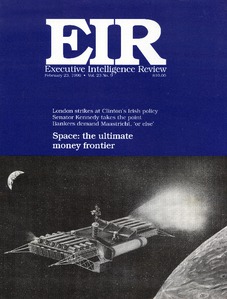Departments
Report from Bonn
by Rainer Apel
OSI Slander Machine Strikes Again.
Elephants and Donkeys
by Kathleen Klenetsky and Mel Klenetsky
Forbes Falls Flat in Iowa Caucuses.
Editorial
The Hamlet Principle.
Economics
Europe’s Bankers Demand Maastricht—‘Or Else’
by William Engdahl
At Davos, the European “globaloney” faction committed themselves to creating a unified currency and a supranational central bank, even if this means a political explosion.
‘Brutally Effective’ IMF Method Triggers Strikes in Russia, Ukraine
by Konstantin George
Russia was able to buy off the coal miners for the short term, but Ukraine, which could not, faces energy catastrophe.
Currency Rates
Business Briefs
Feature
Space: The Ultimate Money Frontier
by Lyndon H. LaRouche, Jr.
“Although space exploration lies as much outside the domain of military expenditure as within, the mid-1950s ‘moth-balling’ of a Huntsville capability for putting a satellite into orbit, typifies the ugly reality of our Hobbesian age.”
Space Program Paid for Itself Many Times Over
by Marsha Freeman
‘Budget-Balancing’ Destroyed U.S. Defense Capabilities
by Marsha Freeman
The downturn of U.S. defense was not in response to a change in military mission. It came from the budget-cutting mania spread by the Mont Pelerin Society.
International
London Strikes Back at Clinton’s Irish Peace Moves
by Mark Burdman
Ask who benefits; and then look for British intelligence’s well-trained provocateurs in actions like the bombing in the Isle of Dogs area of London.
Ulster Unionist: Don’t Split Us from Albion
by William Jones
Colombia’s Samper On the Edge as Prosecutor Readies Charges
by Javier Almario
Londoño Delivers Message in Washington
Who Backs Samper’s ‘Certification’
An EIR policy memorandum.
Documentation: Excerpts from the statements of various pro- certification spokesmen, including former Ambassador to Colombia Charles A. Gillespie Jr. and Inter-American Dialogue President Peter Hakim.
Subject: Reckless Disregard for Truth
by Lyndon H. LaRouche, Jr.
U.S. Presidential candidate Lyndon LaRouche sent this letter to Australian Member of Parliament Clyde Holding.
Israel’s Peres Reports Progress in Peace Talks
by William Engdahl
Mexico’s President Zedillo Burns His Bridges While in Britain
by Carlos Cota Meza and Gretchen Small
International Intelligence
National
Senator Kennedy Takes the Point
by Jeffrey Steinberg
A broad effort is under way among sections of the Democratic Party, to launch a fight for a return to the kinds of policies once associated with Franklin D. Roosevelt and John F. Kennedy.
Senator Kennedy: ‘A Rising Tide Must Lift More Boats’
by Senator Edward M. Kennedy
Text of a Feb. 8 speech to the Center for National Policy in Washington, D.C.
LaRouche Campaigns in New Hampshire for U.S. National Economic Security
by Lyndon H. LaRouche, Jr.
Text of a speech in Manchester on Feb. 6. by the candidate for the Democratic Party’s Presidential nomination.
Rees-Mogg Prepares for Clinton Second Term
by Scott Thompson
Plácido Domingo Supports Verdi Tuning
At his first press conference as the new artistic director of the Washington Opera, the famous tenor reiterated his support for the historic Schiller Institute initiative.
House GOP Treats ‘Russian Organized Crime’ as the New Enemy Image
by Edward Spannaus
National News
Correction
The headline on the article on p. 61 of our last issue was misleading. Rather than, “Gore-Chernomyrdin Agreements Show Risky U.S. Policy vis-à-vis Russia,” the article actually reported that the Gore-Chernomyrdin agreements for technological partnership, in themselves positive, are at risk because they coexist with the destructive overall U.S. policy of pushing Russia into compliance with IMF “reforms.”



